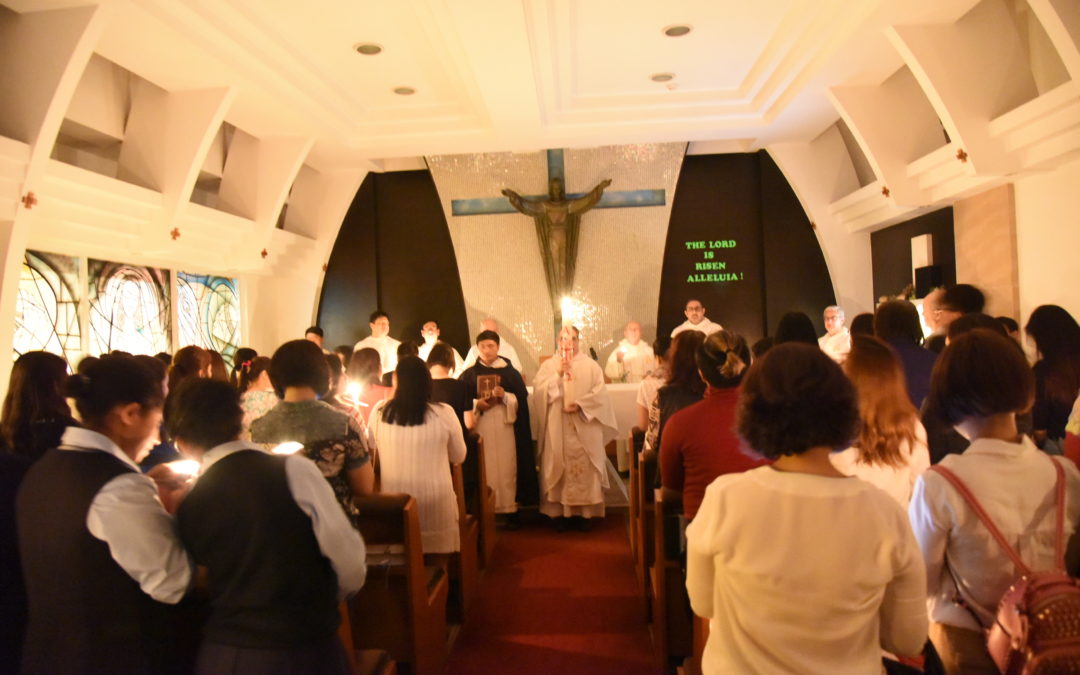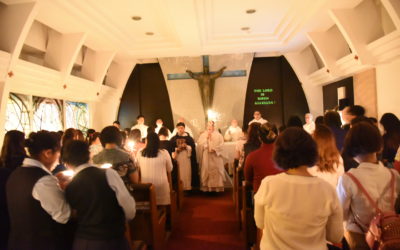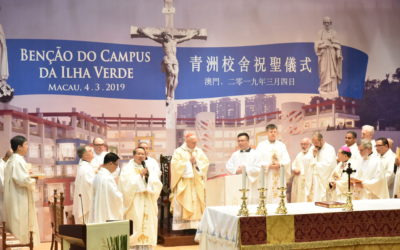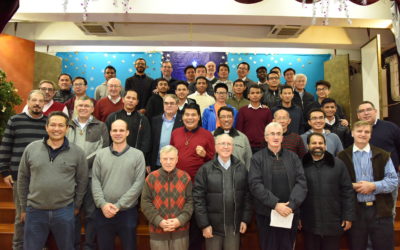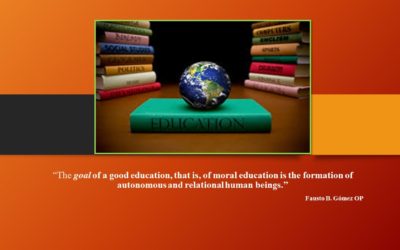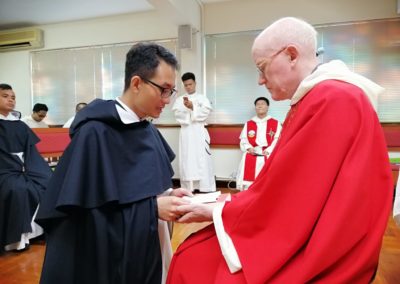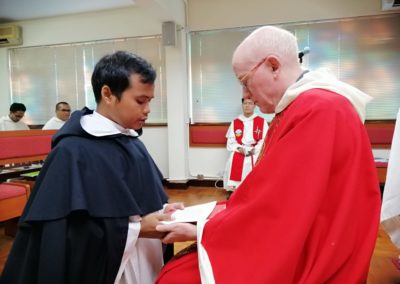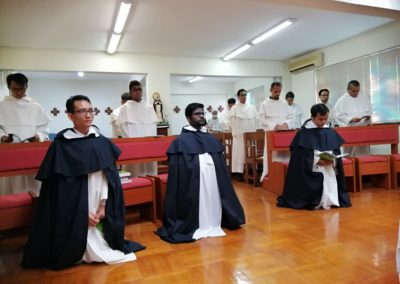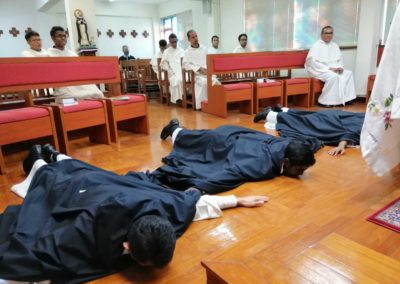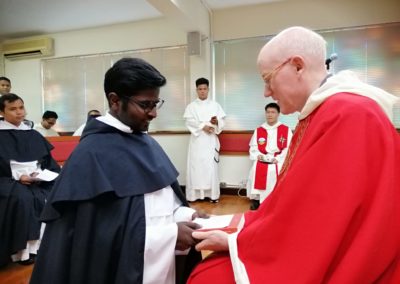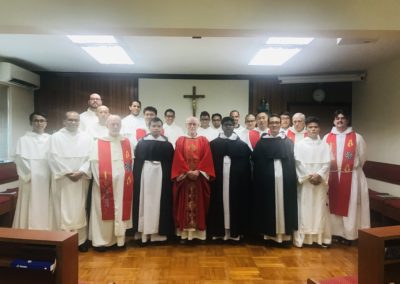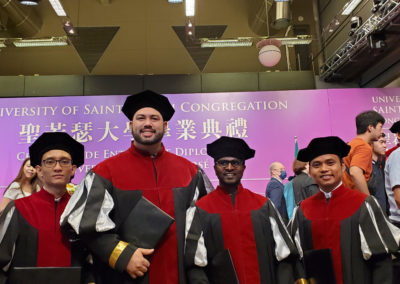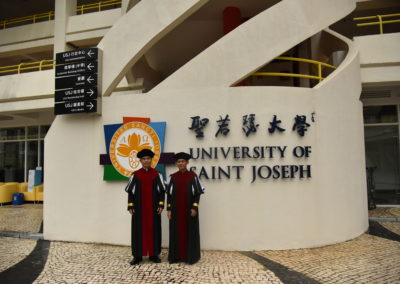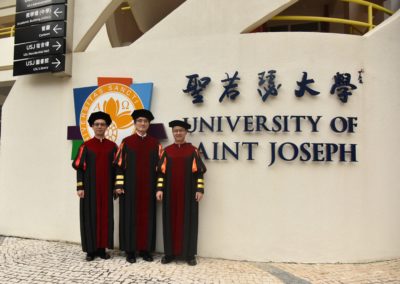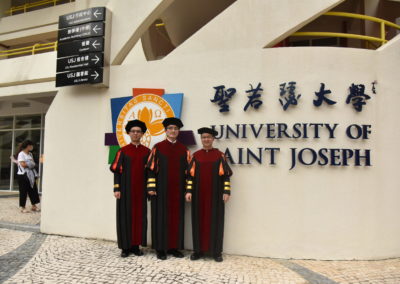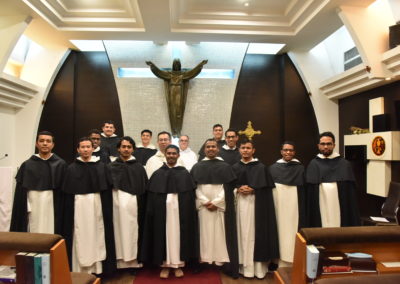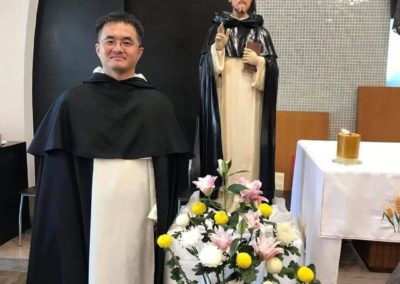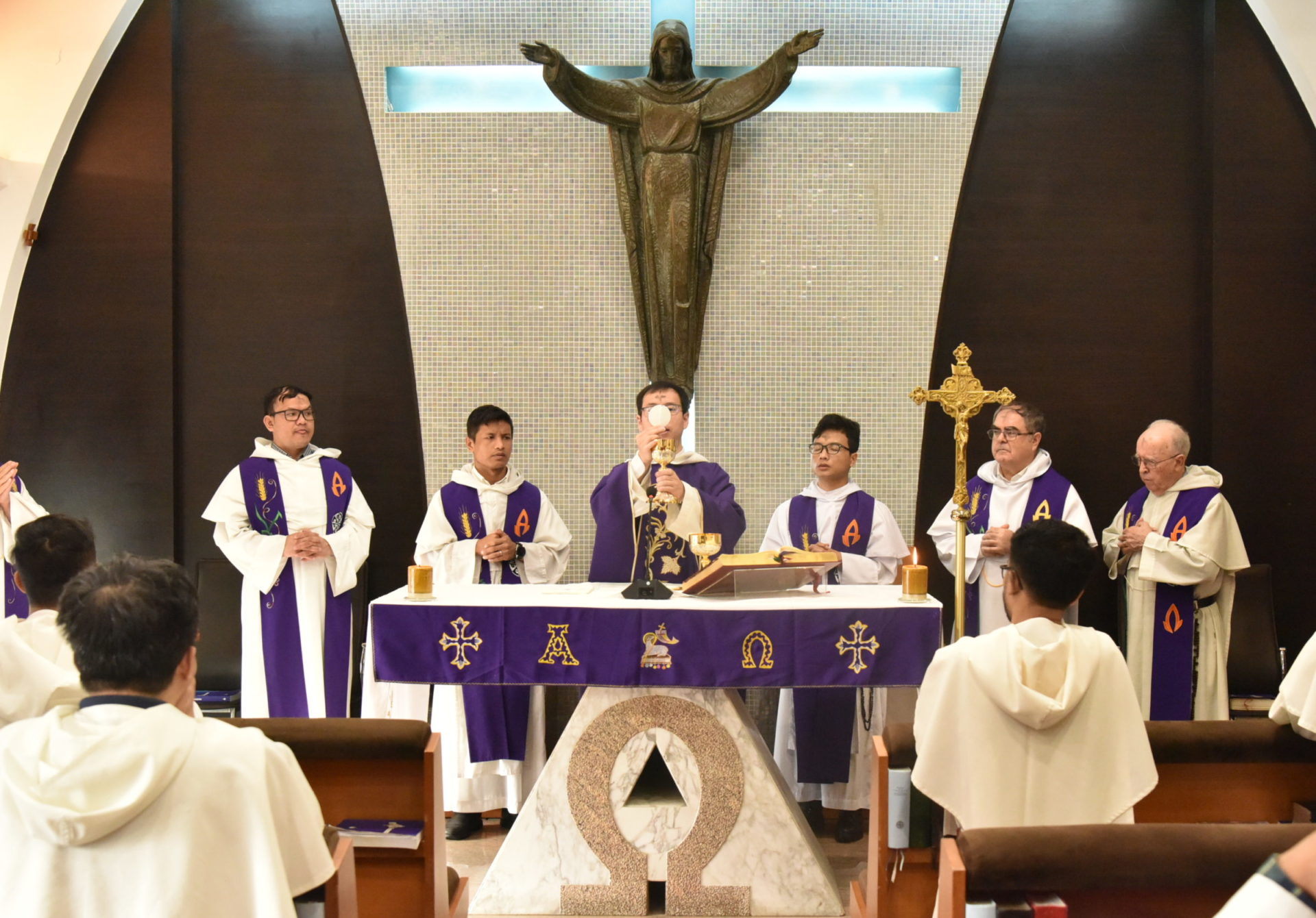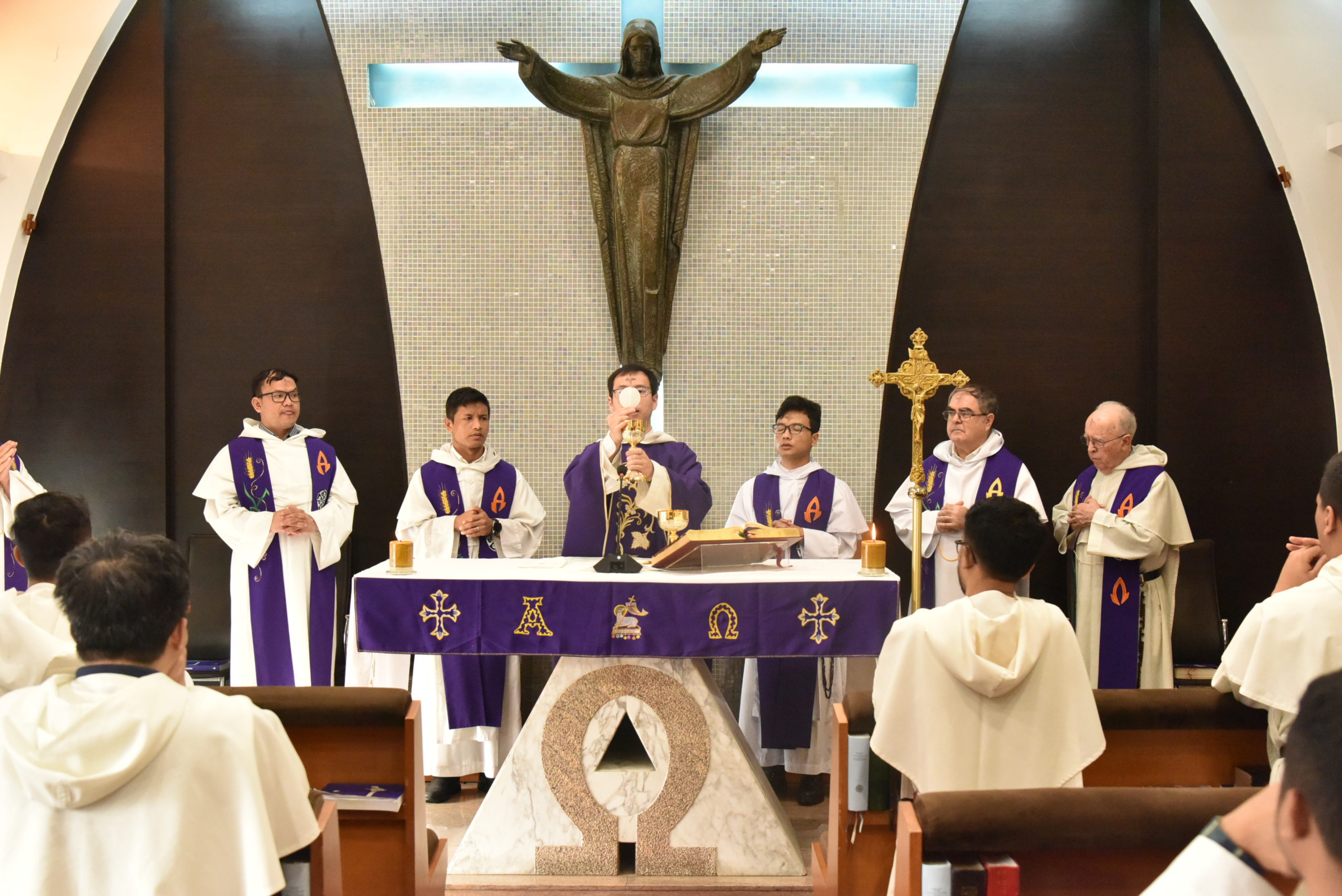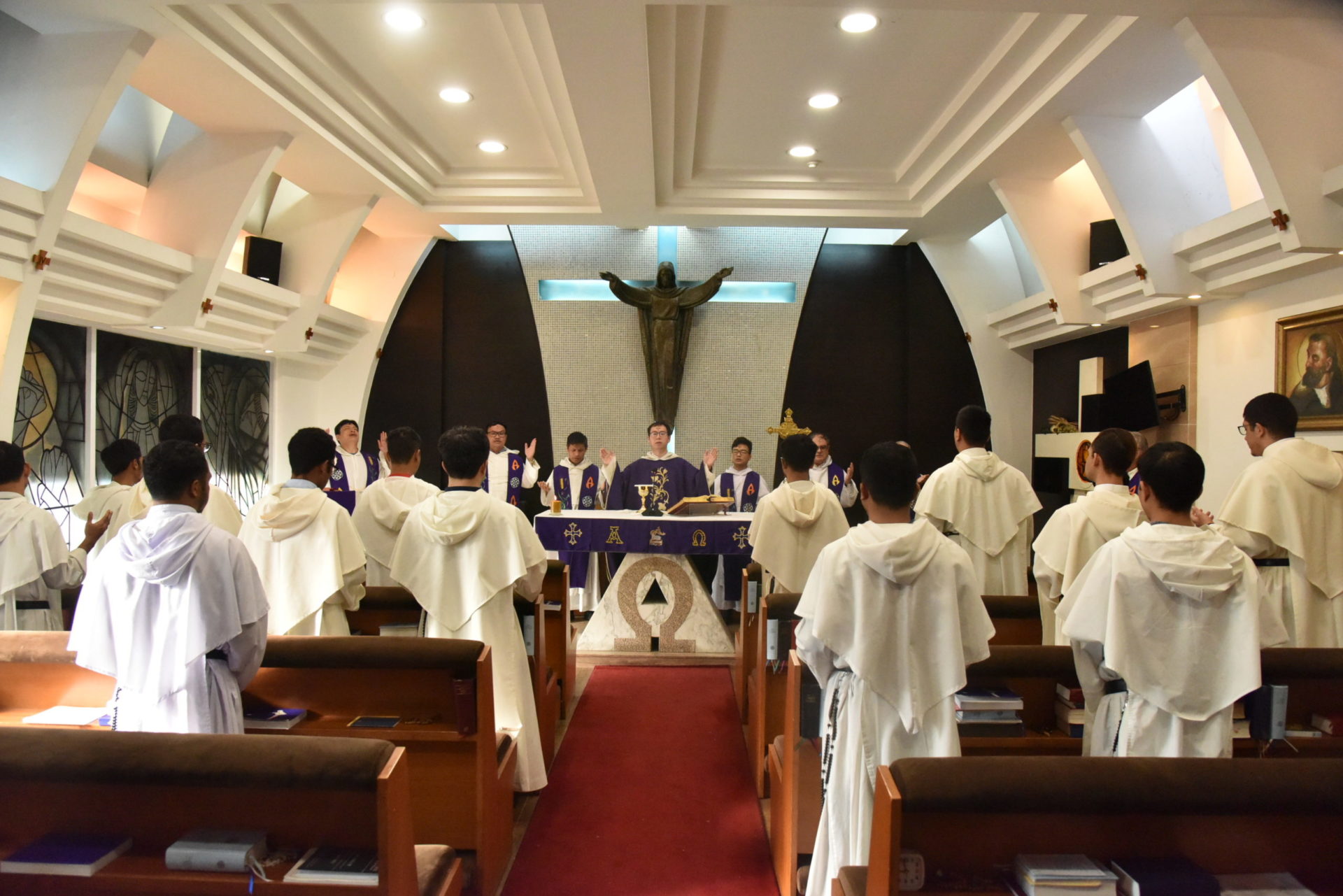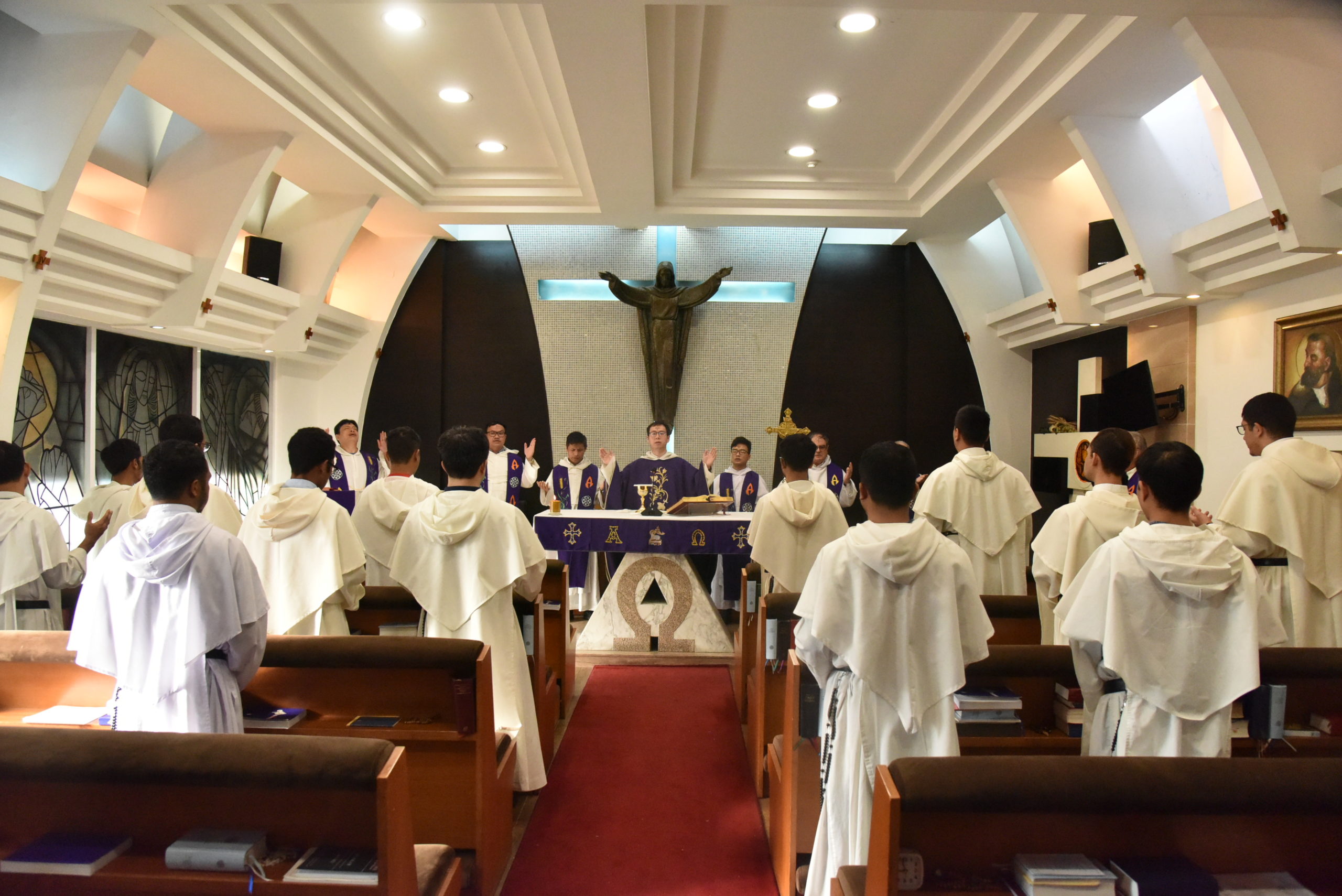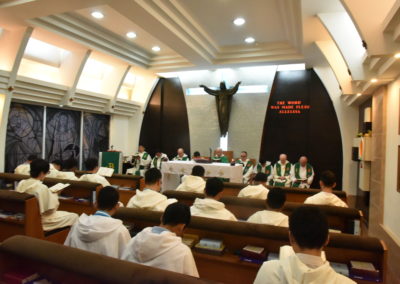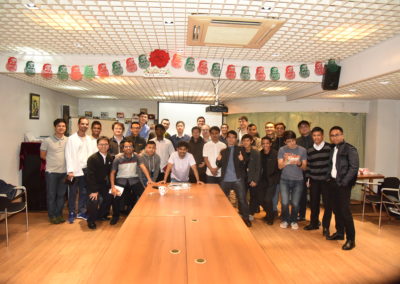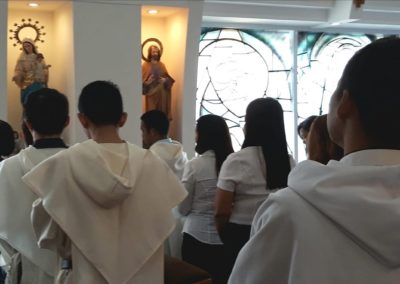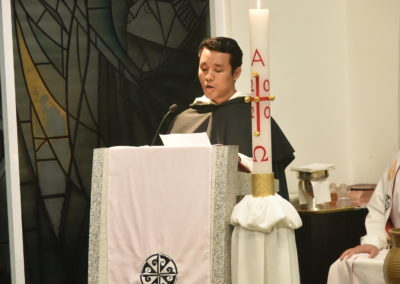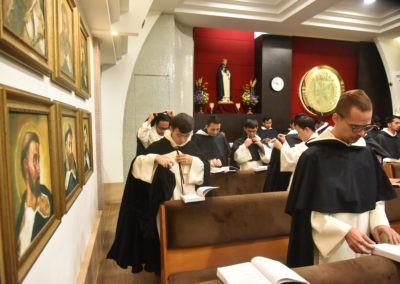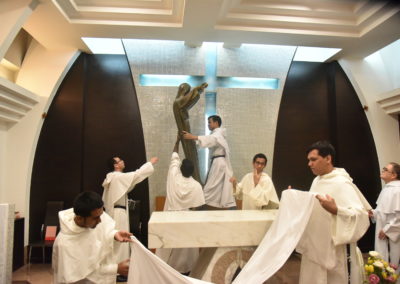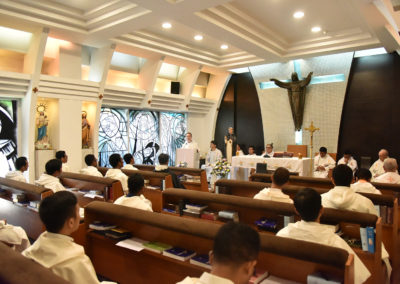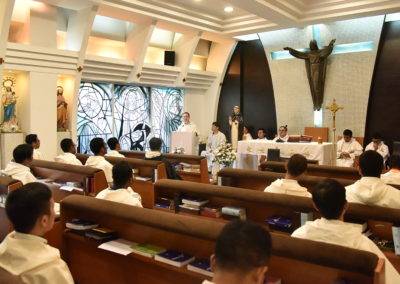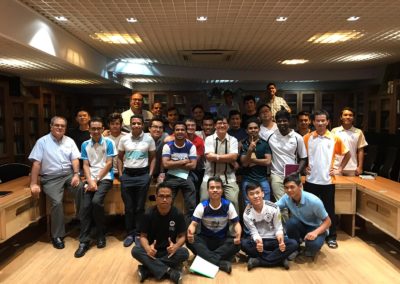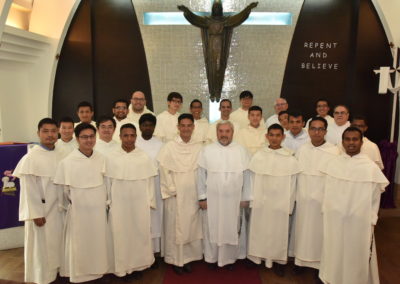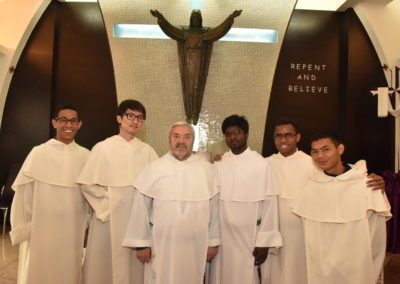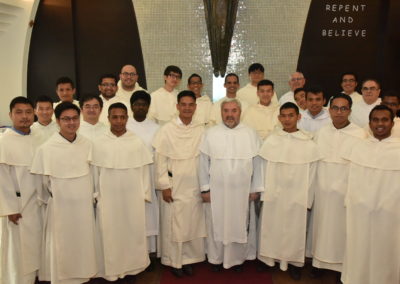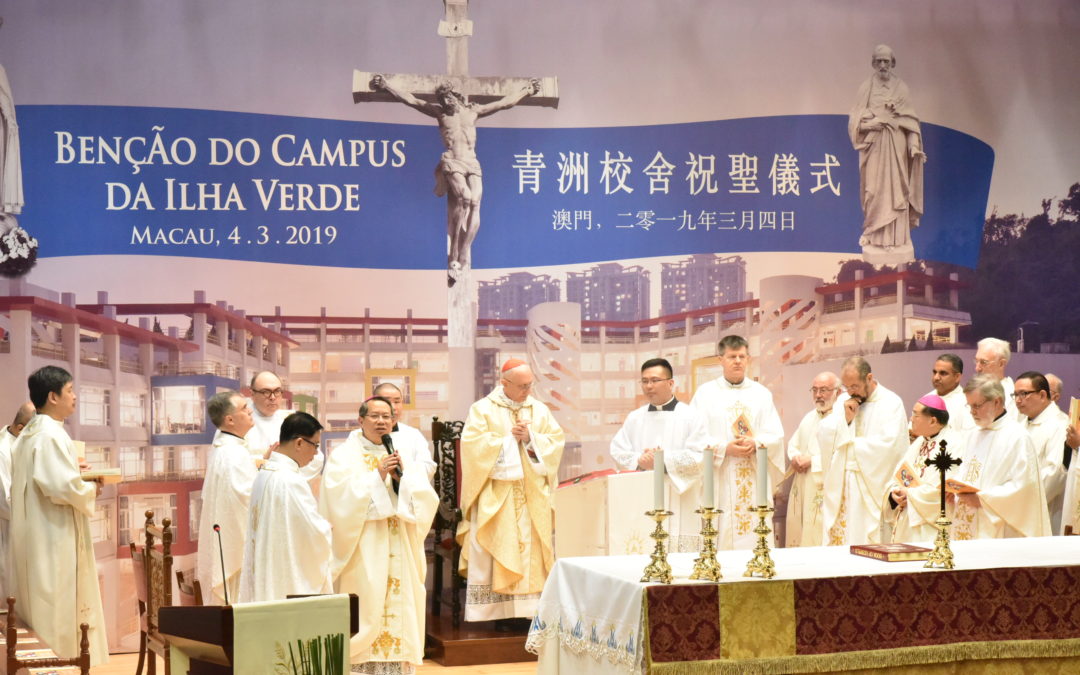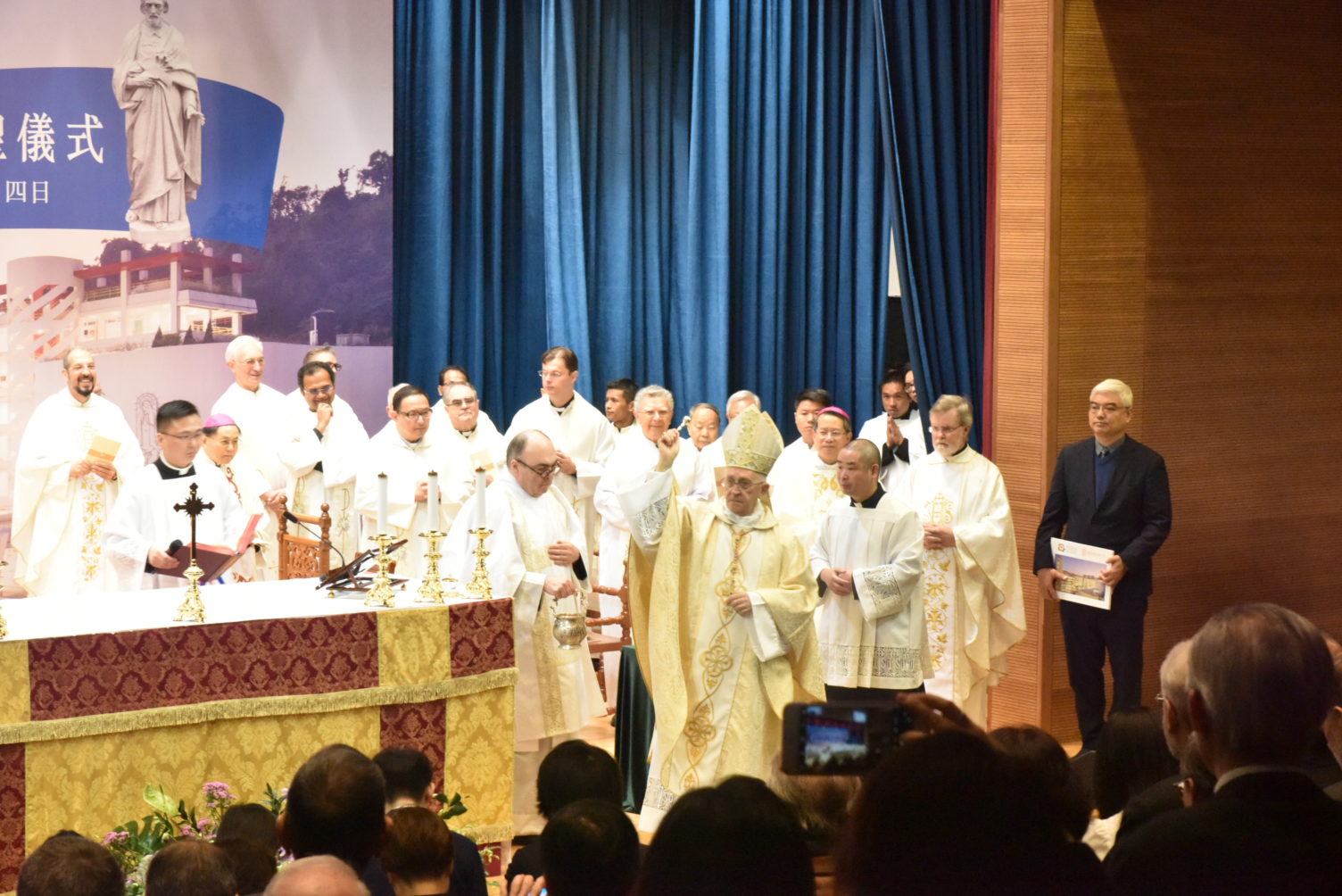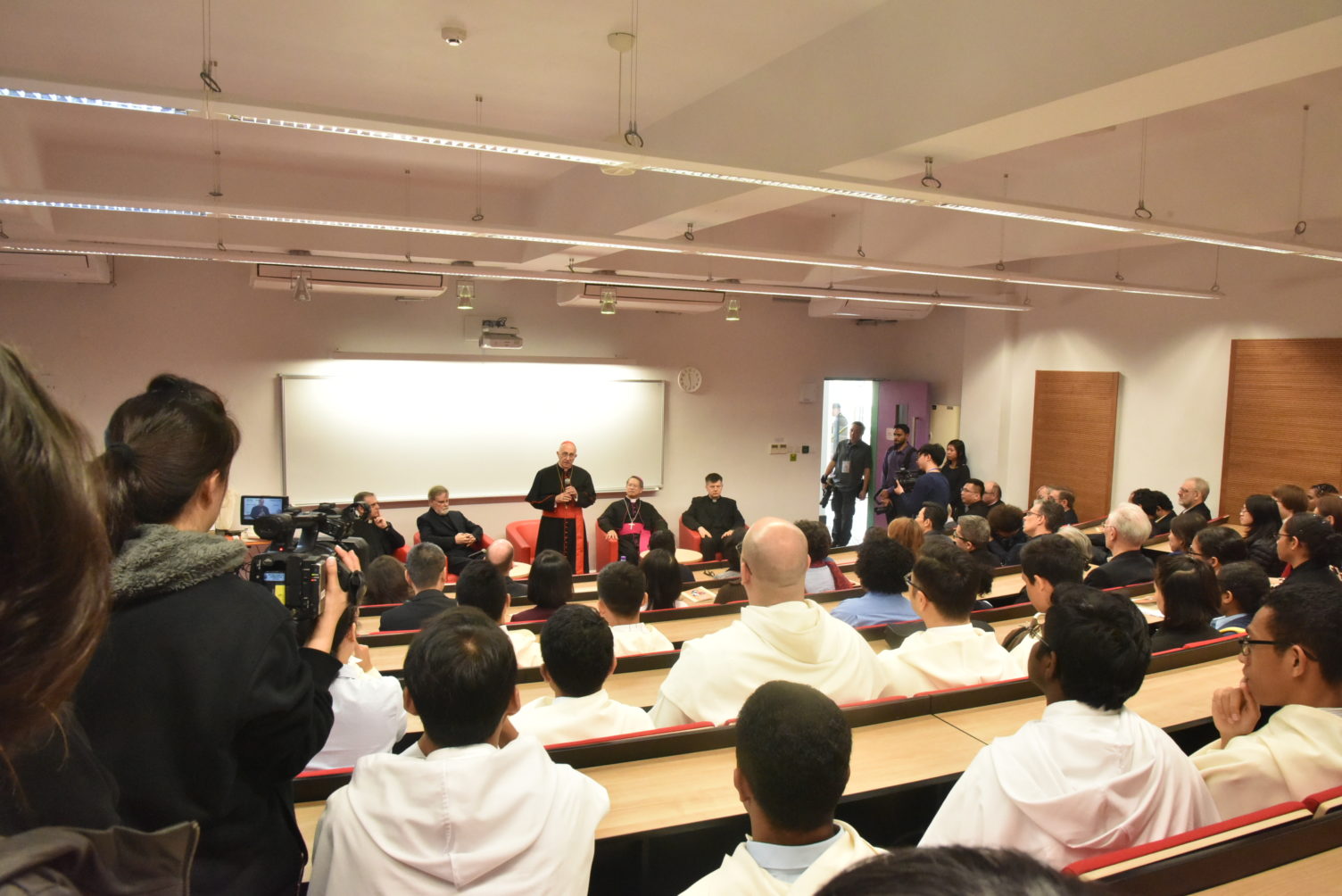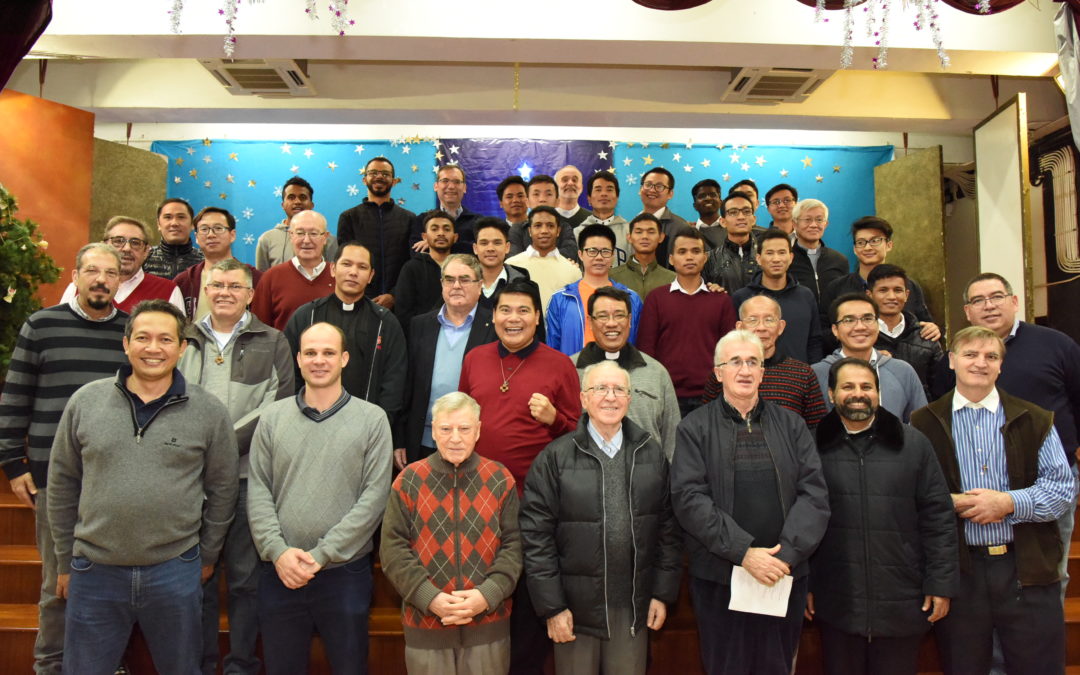
Men Religious from different Orders and Congregations, present in Macau, annually gather together to celebrate the Christmas Feast. Every year in December, different parishes alternatively facilitate venues for them to hold their meeting. This year, the gathering took place in the Church of Our Lady of Fatima Parish, on the 27th of December. Some 50 Religious have participated in the celebration. Most participants are religious priests who are doing their pastoral ministry in Schools and in the Diocese of Macau. Some of the participants are religious brothers who are still in their formation state.
Shortly before the big gathering, which would take place later, Fr. Joseph Angel Castellanos Hernandez (SVD), the parish priest of Fatima Parish, welcomed, at 6:00 pm, all the participants in a small chapel attached to the main Church to begin the evening prayer, led by the Dominican brothers. After the chanting of the psalms, religious priests from different congregations were invited to participate, reading a short scripture passage, leading intercessions and reciting the closing prayer, etc. Right after the closing prayer, the parish priest, together with all participants, warmly welcomed H. E. Bishop Stephen Lee Bun Sang, the bishop of Macau. His presence made the gathering more lively and joyous.
After saying the evening prayer and welcoming the bishop, all participants moved to the social hall of the parish, where all the facilities were arranged beforehand by Fr. James Ho Ngo Lu Vien (SVD), the assistant parish priest. Fr. Andy Vergara, who acted as the coordinator of the gathering, invited everyone to introduce himself, since some new religious, who had been recently assigned in Macau, were present. After that, he requested the bishop to deliver a short Christmas message to the religious who were present in the gathering.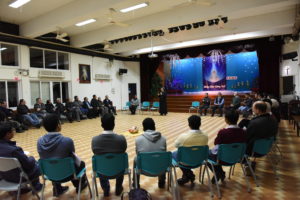
Bishop Stephen Lee began his speech by saying that he was really happy to join the gathering and to see young religious brothers who reminded him of his early age in perusal of his religious vocation like them. The bishop brought up two points as his Christmas message to all the participants: the first message was to bring mercy to everyone, so that in this way, every religious would reach out to the world through his way of life, initiated in themselves and exercised in their communities. The second message concerned the pastoral ministry in the parishes, regarding the upbringing the role of youths and valuing authenticity of family life in the parish. He gave a short evaluation on this second point by saying that the crucial role of the youths in the parish must be recognized by those who minister to the youth, as well as their families. The genuine family life in the Church is important because the good and promising youths are brought up by good families. Putting emphasis in their family life and youths would surely make flourish new vocations in the Church, too. Then, the bishop wished everyone to have a blessed and happy Christmas. The compelling message of the bishop would surely be a powerful stimulus for all participants to begin the coming New Year with a rigorous program.
Afterward, the singing of Silent Night, the famous beautiful Christmas song, in different languages followed, as the religious present belonged to different nationalities. The singing was accompanied by the accordion played by Fr. Angel SVD, and the guitar, played by Bro. Abraham OP. In line with the first message of the bishop regarding Mercy, a Chinese Jesuit priest, sang a Marian song, in honor of Our Lady in this Christmas Feast,.
A fraternal dinner and an animated mutual conversation with one another followed, as the celebration was going on. Throughout the gathering, everyone was happy to celebrate the coming of our Lord by sharing joy, love and hope.
I wish you all a Blessed and Merry Christmas!

Bro. Stephen Saw Lei Kapaw. O.P.
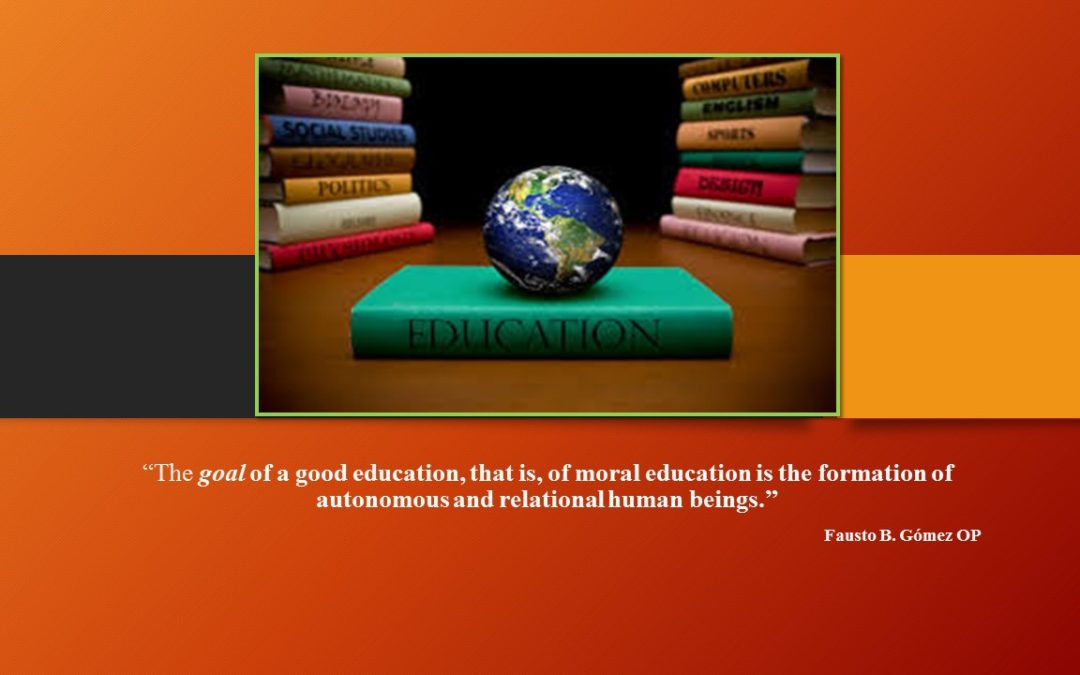
FAUSTO GOMEZ OP
We are told that about 70 million children worldwide do not go to school and around 1.7 million teachers are needed to provide a qualified primary education at a global level. As Malala Yousafzai, the young Pakistani girl wounded by the Taliban for attending school, says: A child, a teacher, a book, and a pen can change the world. Education is the only solution.
The right to education is one of the fundamental and universal human rights. Every person possesses by nature the right to education as essential part of human dignity. The person without a free basic education may be considered among the poorest of the poor. For Christians, instructing the ignorant is a spiritual work of mercy. St. Augustine and St. Thomas Aquinas affirm that the greatest work of mercy is helping human persons journey from the darkness of ignorance to the light of truth. As Pope Paul VI says, hunger for education is not less debasing than hunger for food: an illiterate is a human being with an undernourished mind. The ignorance of the culturally marginalized is, according to the Latin-American Bishops, an inhuman slavery.
The word education comes from the Latin verb educere, which means to draw out – the immense powers of the human being. Education is ordered through different activities to developing the potentialities of students as human beings, future professionals, believers and agents of social transformation.
Education is the process of a harmonious physical, psychological, mental, social, moral and spiritual development of the human being. It helps the human being become aware of his or her identity as an individual person and a social bei as a member of a family, a nation, the world. Education is a mediation of culture and the primary task of cultures. From a human and Christian perspective, education is the process thorough which the human being becomes free and responsible with and for others. In Christian perspective, education makes a necessary reference to Christ and to evangelical values: Christ is the foundation of the whole educational enterprise and the principles of his Gospel as primary educational norms (Vatican Congregation for Catholic Education, The Catholic School).
The agents of education are in the first place the family: parents in particular are the first and foremost educators of culture and faith. The schools have an essential role in educating our children and youth in human and cultural values. The Church contributes to the education of the youth through Catholic schools and universities and also through her parishes and various associations and communities. The ubiquitous and ambivalent means of education today are the mass media, in particular the internet pathways and its numberless windows. Education cannot be neutral. It radically involves the search for truth and the practice of goodness. In a world permeated by hypocrisy, appearances, and political correctness, the search for the truth is fundamental: In the truth lies the foundation of man dignity and freedom (John Paul II). To be truly educational and formative, the search for truth is accompanied by doing the truth in love.
Education is either according or opposed to basic ethical norms: the human person free and responsible is an ethical being. There is a radical need today of moral education. Moral education is aptly defined as a pilgrimage towards ethical maturity (W. Kay). Genuine moral education is not banking education, but problem-posing and problem-solving education. It is not an un-free or oppressive or domesticating education, but a free, responsible and liberating education. A fully human and integral formation implies the education of the intellect and of the will, including the education of the passions and emotions.
Moral education focuses on the formation of a true and upright conscience. In ethical perspective, the formation of conscience is achieved through the conquering of evil and sin, and the acquisition of virtues. Aristotle says: It would seem right for each man to help his children and friends towards virtue. Forming conscience requires practicing virtues. Deforming conscience, on the contrary, entails lack of interest in the truth and adherence to sin: It is possible to discard the decision of conscience for lack of moral virtues (St. Thomas Aquinas); a bad conscience may make a person “sightless as a result of habitual sin (Vatican II, Gaudium et Spes).
In this context, moral laws – which are rooted in natural law or the law of being human are part of an authentic process of education and are not opposed to a good conscience; rather, they strengthen and guide when duly interiorized – the decisions of a good conscience. Truth is a condition of freedom and also of conscience: Freedom of conscience is never freedom from the truth but always and only freedom in the truth (John Paul II, Veritatis Splendor). Conscience is not doing what one likes,but doing what is right. Indeed, only the truth will make us free (Jn 8:32).
The goal of a good education, that is, of moral education is the formation of autonomous and relational human beings. The means to achieve the goal are the knowledge and realization of among others – the values of autonomy, justice and love, including the main moral virtues, headed by prudence.
Forming a true and upright conscience involves educating in autonomy, in the promotion of the self-realization of the person in the search for authenticity and truth. The human person is a unique individual. His/her dignity implies his or her autonomy or self-determination. The human being develops personal autonomy through an education that begins in childhood as directive education, and becomes in youth and more so in – adulthood non-directive education. The path from heteronomy to true autonomy goes from the total dependence of the child to the relative independence of the adult. There is no absolute independence: all humans are social beings, and God creatures and stewards. And there should not be absolute dependence, as exemplified by slavery, extreme authoritarianism and paternalism: human beings are autonomous and free.
Human dignity implies not only autonomy but also relationship: every human being is autonomous and relational. Hence true education, including education of conscience, entails educating in otherness by aiding the educated to be human persons open to others and to God. Moral autonomy is realized when relationships with others are lived “in key of mutual and horizontal respectâ (Marciano Vidal).
The second value to be developed through moral education after and with autonomy is the value of justice, as the nucleus of moral and social axiology. Justice is the value, the virtue that inclines us to give to each person what is his or hers, in the first place his/her rights. Two main references of justice are: equality, meaning all humans are equal, and reciprocity, that is, equitative participation in social life (M. Vidal). The content of an education for justice, which is centered on human dignity and rights, is grounded on the four pillars of the social order – justice, truth, freedom and love – and guided by the ethical principles of the common good, solidarity and subsidiarity, stewardship, the universal destination of the goods of the earth, and the preferential option for the poor.
Radically, every human being is autonomous and relates in justice with others. However, justice needs the life of love, which is the third and the main value of education, moral education, and the formation of an upright conscience. In ethical and Christian perspective, love is the form of all virtues, that is, it gives life to all other virtues and values. Love inclines us to give to another person not only what is his or hers, but also of what is somehow ours. Love is the value and the virtue which defines our humanity and also our faith. Authentic love is grounded on truth, perfects justice, and expresses true freedom. Authentic moral education is perfected by the acquisition of virtues. Aristotle says: “It is not unimportant then to acquire one set of habit or another right from youth. On the contrary, it is very important, indeed all important. Main virtues to be acquired through the repetition of the corresponding acts and God grace – are the four interconnected cardinal virtues of prudence, justice, fortitude and temperance. Prudence, the virtue that judges and discerns and acts rightly is duly singled out: “Prudent education teaches virtue (CCC 1784; see also 2223).
For Christians and other believers, moral education is moral and spiritual education. Formation in the faith, catechesis, or religious instruction is for the Christian an essential element towards achieving moral adulthood and a Christian conscience. Well educated or instructed Christians are asked by their humanity and faith, to witness a true and certain conscience, to be free and responsible, to practice the seven virtues that make a Christian or believer: the three theological virtues of faith, hope and love which connect us to God -, and the four cardinal virtues of prudence, justice, fortitude and temperance which link us to other human beings and creation. Difficult? Virtues pray!
(Published by O Clarim, Macau Catholic Weekly: September 23, 2016)
